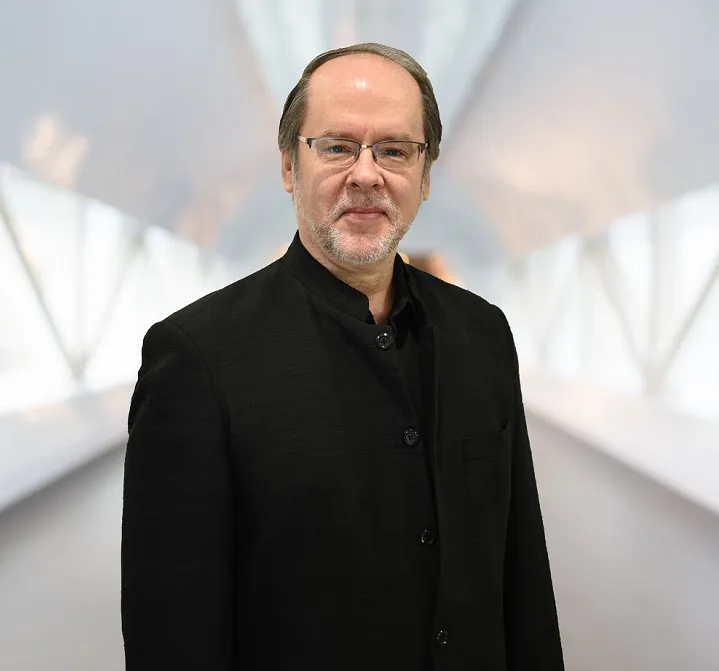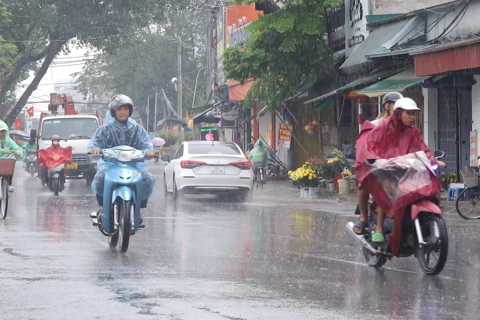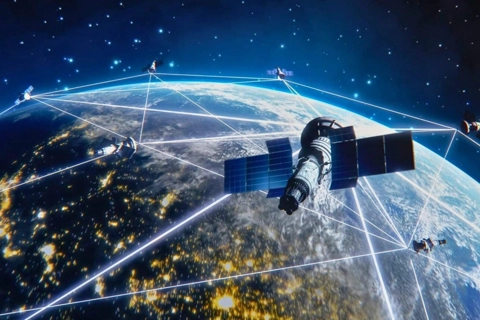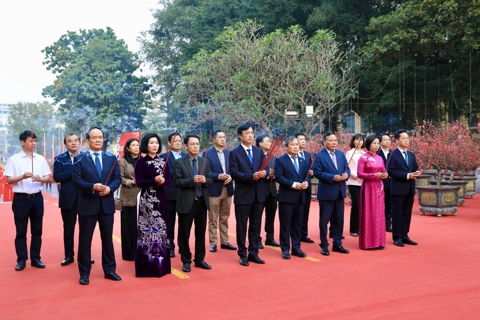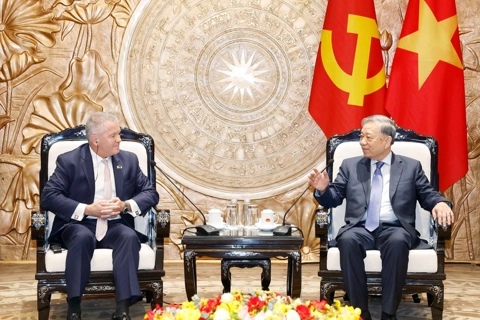Patriotism: The tranquil and steady devotion of a lifetime
Vietnam was a country that had survived the worst that two world powers had thrown at it and held its collective head high, ready, willing, and eager to forge ahead into a glowing future.
National Day is so meaningful to every Vietnamese that foreigners can feel how much the people of the country are worth for overcoming challenges to become a nation where people don't obsess about the past but cherish it and consider everyone, even their old enemies, as friends. Such a spirit has earned the respect of international friends.
| Dr. Mark Ashwill is co-founder and managing director of Capstone Education. |
The Hanoi Times is honored to present Dr. Mark Ashwill's valuable affection for Vietnam. He's an international educator and entrepreneur who has lived in Vietnam since 2005. He is the co-founder and managing director of Capstone Education, a full-service educational consulting company with offices in Hanoi and HCMC.
"Two roads diverged in a wood, and I, I took the one less traveled by, and that has made all the difference." – Robert Frost (1874-1963)
During my first trip to Vietnam in January 1996 to set up a summer program for US students, I caught a glimpse of what could be a rapidly changing nation just opening up to the world after decades of isolation and poverty, largely the result of a US-led economic embargo and the legacy of two cataclysmic wars with France and the US following in the former’s bloody and foolhardy footsteps. What I knew about Vietnam at the time came mostly from history books and a few Vietnamese students who had studied in the US in the "early days."
Even though it was then one of the poorest countries in the world with a per capita income of just over $300 per year, I saw deep reservoirs of energy, spontaneity, and ingenuity. I sensed a driving ambition and an ocean of untapped potential. Vietnam was a country that had survived the worst that two world powers had thrown at it and held its collective head high, ready, willing, and eager to forge ahead into a glowing future. It was an inspirational and electric place where necessity was truly the mother of invention.
That was a time when the historic renovation reforms of 1986 (Doi Moi), a fateful example of the official determination to bend rather than break, were beginning to kick in. There was the pervasive feeling that Vietnam would rise like a phoenix from the ashes, in spite of the legion of limitations imposed by war, poverty, and mismanagement (then Prime Minister Pham Van Dong told a visitor in the late 1970s that "waging a war is easy, but running a country is very difficult"), and a US-imposed comprehensive trade embargo. This sense of boundless possibility is one of the reasons I took the road less traveled and moved here in 2005.
During the past 28 years, over half of which I have had the privilege of witnessing first hand the changes, including positive, and negative, and that vast expanse of gray, it has done precisely that, much to the credit of the Vietnamese people and some pivotal government policies.
The long and rocky road to progress
Unlike many foreigners, not a few of whom think they know better and are steeped in a cultural superiority complex, also known as nationalism, I am not prone to offering unsolicited advice because, after all, Vietnam belongs to the Vietnamese. Even those of us who have been here for a long time, the expatriates and ex-patriots, are still guests.
Those of us who think and act as global citizens occasionally share our knowledge and experience not because we think "our way" is better but because we care. We know that Vietnam can be better than it is. We breathe the same air, eat the same food, walk on the same streets, and drive on the same roads. As employers, we hire from the same pool of applicants. Our motivation is a marriage of self-interest and altruism, both mutually inclusive, in this case.
Over the past 19 years, I have witnessed a number of unifying events that have warmed my heart and reinforced my view of the Vietnamese as patriots who love and are devoted to their country, a dictionary definition of patriotism, taking joyful pride in its achievements, including tournament football. One notable cathartic event was not one of jubilation but rather profound national sorrow and loss: the death of General Vo Nguyen Giap in 2013.
While patriots justifiably celebrate national achievements in development, quality of life, education, the arts and sciences, and sports, etc., they are also capable of constructive criticism of their country because they want it to be better. In the words of Adlai Stevenson II, one-time US presidential candidate and US ambassador to the U.N., these individuals possess "a patriotism that puts country ahead of self; a patriotism which is not short, frenzied outbursts of emotion, but the tranquil and steady dedication of a lifetime."
| The national flag is raised on the occasion of National Day (September 2). Photo: The Hanoi Times |
Land of opportunity & unmet challenges
Vietnam’s economy continues to grow at an impressive pace. This torrid growth, the result of strong exports and record foreign direct investment (FDI), while it doesn’t yet benefit everyone, is lifting the economic boats of most Vietnamese.
For these and other reasons, Vietnam has become a land of opportunity for millions of people, including foreign entrepreneurs who are adventurous, well-prepared, and flexible enough to set up shop and put down roots here and who, in the world of work, are able to build highly effective bilingual and bicultural teams.
One negative macro-change is a gradual shift that appears to be accelerating, from a communal orientation to an individualistic one, from “we” to “I.” Part of this insidious trend is the notion that one person’s “freedom to” supersedes others’ “freedom from.”
It is the rise of self-centeredness in which individual needs and wants must be fulfilled, regardless of the cost, literal and otherwise, to those around us and to nature. I suspect that the reasons are neoliberal capitalism, which Vietnam has embraced with a vengeance, for better and for worse, and the values of extreme individualism imported from the West.
An example of this decline in civility is what I refer to as Jekyll and Hyde on wheels. As I wrote in a 2022 essay last year, “It’s as if jumping on a motorbike or into a car transforms most Vietnamese into aggressive individuals who only care about themselves. Off the highway, most people are normally polite and civilized and would likely go out of their way to help if needed.”
An existential issue is how many Vietnamese treat the environment with utter contempt by using it as their collective rubbish bin. This ranges from dumping in fields and waterways, throwing garbage out the window of a vehicle, to burning toxic materials.
Striking a balance
Every society needs a happy medium, a balance between collectivism and individualism. On the one hand, all of us should be able to “shine, given the right lighting,” in the words of US writer Susan Cain, meaning to pursue our own interests, develop our abilities and talents, and realize our potential as creative human beings under optimal conditions.
On the other side of the same coin, good citizens have responsibilities and should feel a sense of connectedness to other people and the environment that sustains us all. Without it, society becomes a hypercompetitive dog-eat-dog world in which fairness, order, and respect are supplanted by inequity, chaos, and incivility.
Vietnam’s National Day is a fitting time to take stock of what this country and its people have accomplished but also to reflect on what each and every citizen can do to address unmet needs and challenges and make Vietnam an even better place to live, including environmental awareness and action, heightened civility on the roads, business ethics, and other concrete areas that are within their control.
On a personal note, it is a time to reflect on my gratitude to this country, which has suffered so much at the hands of foreigners, including those from the country whose passport I hold, for its willingness to embrace me and many others, for giving me the chance to contribute to my chosen profession doing work that I find deeply satisfying and richly rewarding, and for allowing me to take the road less traveled by. It has indeed made all the difference.


